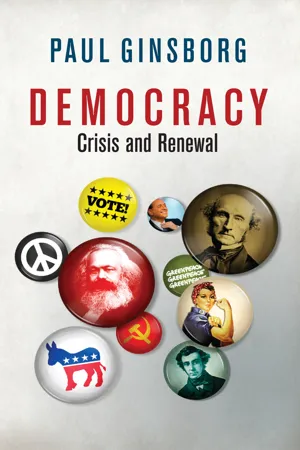Democracy
About this book
Political parties have lost swathes of members and effective power is ever more concentrated in the hands of their leaders. Behind these trends lie changing relationships between economics, the media and politics. Electoral spending has spiralled out of all control, with powerful economic interests exercising undue influence. The 'level playing field', on which democracy's contests have supposedly been fought, has become ever more sloping and uneven. In many 'democratic' countries media coverage, especially that of television, is heavily biased. Electors become viewers and active participation gives way to mass passivity. Can things change? By going back to the roots of democracy and examining the relationship between representative and participatory democracy, political historian Paul Ginsborg shows that they can and must.
Tools to learn more effectively

Saving Books

Keyword Search

Annotating Text

Listen to it instead
Information
Table of contents
- Cover Page
- Title Page
- Copyright Page
- Contents
- Dedication
- Prelude: A meeting of minds
- Part 1
- Part 2
- Part 3
- Epilogue: Marx and Mill in heaven, spring 2008
- Notes
- Bibliography
- Index
Frequently asked questions
- Essential is ideal for learners and professionals who enjoy exploring a wide range of subjects. Access the Essential Library with 800,000+ trusted titles and best-sellers across business, personal growth, and the humanities. Includes unlimited reading time and Standard Read Aloud voice.
- Complete: Perfect for advanced learners and researchers needing full, unrestricted access. Unlock 1.4M+ books across hundreds of subjects, including academic and specialized titles. The Complete Plan also includes advanced features like Premium Read Aloud and Research Assistant.
Please note we cannot support devices running on iOS 13 and Android 7 or earlier. Learn more about using the app
